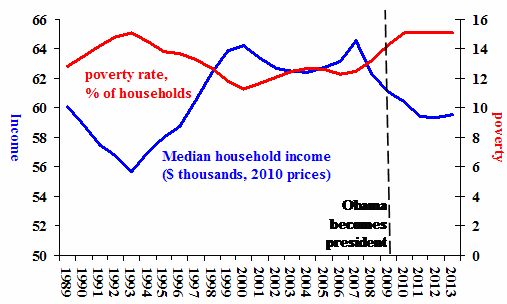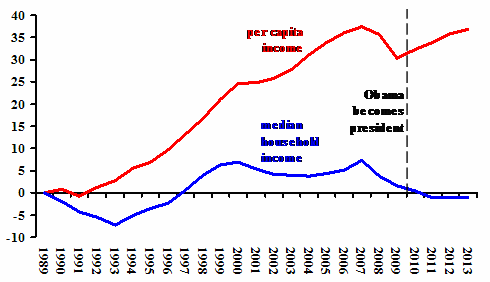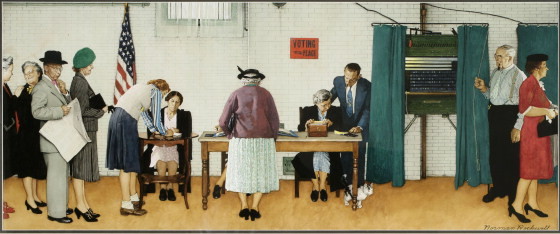As must readers of are likely to know, the UK Guardian is one of the few English language left-of-center daily newspapers (and free to read online, though I recommend the app). It carries quite a lot of news about the United States, but, I regret to report, can on occasion get a story spectacularly wrong.
A case in point appeared on the penultimate day of October, and you were told that something quite strange was allegedly occurring in the United States in the run-up to the midterm elections:
"In the US, Mr Obama's Democrats seem to be heading for a clunking defeat in the midterm elections next week. This disjuncture between economic performance and political success would seem to upend one of the great clichés of modern politics. These days it's the economy stupid - except when it isn't."
To state simply what the Guardian believes is a striking anomaly, the U.S. economy is doing well, but most voters will go Republican. How irrational, the Guardian editorial tells us.
How do we explain this unexpected outcome, when, as Bill Clinton famously told one and all, and the Guardian repeats, when the economy goes well voters reward the party of the president?
Had the Guardian editorial writer(s) read another London-based daily, the Financial Times on the previous Saturday, 26 October), he, she or they would have discovered there is no "disjuncture" to perplex them. The first sentence of the article on page 8 of the FT print edition informs the reader,
"The US economy has grown but incomes have not -- creating a mood of sour populism directed largely at Barack Obama that threatens to sweep Democrats from power in midterm elections in early November."
Here we have a clear case of what might be called "GDP fetishism," a perversion frequently practiced by UK Chancellor George Osborne when seeking to demonstrate his self-proclaimed success in reviving the British economy (look at the BBC report, "UK fastest growing Western economy") and currently under use by President Obama on the campaign trail. The Guardian editorial makes its enthusiasm for this particular fetish quite clear, "Figures released on Thursday showed the US economy growing by 3.5% over 12 month", neglecting to ask the question, 3.5% for whom?
For households, their median income in 2013 was lower than it had been in 2007 despite a higher GDP (median income is the income level at the mid-point of the household distribution). Even more indicative of how bad thinks have been for the eponymous 99%, median income was down in 47 of the 50 states according to the statistics presented in the FT article (which cites American Factfinder and RealClearPolitics, though the original source is the U.S. Census Bureau).
The longer-term statistics found in the annual Economic Report of the President reinforces the message from income by states. The chart below gives real median family income and the percentage of households in poverty for the United States as a whole, 1989-2013 (1989 because it was the highest since the end of WWII).
After rising through the 1990s, the income of the median household stagnated during 2000-2007. During the Great Recession it fell, of course, and the poverty rate rose (red line in the chart, calculated for an income poverty line, which is an absolute measure). The bad news for American families and the Democratic Party is that household income has fallen since Obama became president.
The Guardian's "disjuncture" completely disappears when we learn that after Obama took office in 2009 median household income fell by almost eight percent through 2013 and poverty has risen.

US Median household income and poverty rate, 1989-2013
Source: Economic report of the President 2014, Tables.
The inappropriateness of GDP as the measure of the economic benefits for the vast majority is further demonstrated in a second chart. Over the 25 calendar years 1989-2013 GDP per capita rose by 37%. By contrast the income of the "typical" (median) family crawled only to 7% above its 1989 value at its highest, and during the Obama presidency dropped below where it was in 1989. Meanwhile, GDP per head rose by 7% under Obama.

Indices of real US per capita income and median family income, 1989-2013
Source: Economic report of the President 2014, Tables.
How can GDP per person rise and the income of the vast majority of the population decline? It's distribution, stupid. And those voters in the 99 percent know it, stupid. They are worse off, and as a result we face a high probability that troglodyte Republicans will control both houses of the U.S. Congress.

